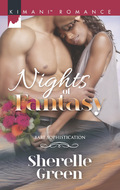Kitap dosya olarak indirilemez ancak uygulamamız üzerinden veya online olarak web sitemizden okunabilir.
Kitabı oku: «Destination Love»
“Don’t you feel well?”
His eyes had the look of an approaching storm on a dark night. “This past week has taught me what it feels like to be a starving man, one who is only allowed to look at a feast and never allowed to eat it. Oh, Sheri, I need you so badly.”
She opened her arms to him, and he gripped her like a man clinging to life. “Come over here and sit down here with me,” she said, taking his hand. Sheri didn’t intend to rush through what she needed so badly from him. “Let’s have some of this rosé…” She handed him the bottle and a corkscrew.
“It’s a good wine. I thought you were planning to bring it back home with you.”
“I bought it for us.” She took two wineglasses from the mini bar.
He filled them and patted the seat beside him on the sofa. “To the woman who is quickly becoming my world,” he said. He sipped the wine and let the lush liquid slide down his throat.
He gazed steadily into her eyes, and Sheri realized that although the two of them knew they would make love, they didn’t know how to start. He’d promised to keep his distance, and she had pledged not to tease or provoke him into lovemaking. She drained her glass and put it aside.
“Uh…aren’t you going to kiss me?” she asked him.
“Sheri, love, if I have to kiss you and leave, I’d rather go right now.”
She leaned back against the sofa and removed her jewelry and the two-inch dangling earrings.
“Sheri, for heaven’s sake. I’m human.”
“I’m doing my best to show you that I know that.”
GWYNNE FORSTER
is a national bestselling author of more than twenty romance novels and novellas, as well as general fiction. She has worked as a journalist, a university professor and as a senior officer for the United Nations. She holds a bachelor’s and a master’s degree in sociology, and a master’s degree in economics/demography.
Gwynne sings in her church choir, loves to entertain at dinner parties, is a gourmet cook and an avid gardener. She enjoys jazz, opera, classical music and the blues. She also likes to visit museums and art galleries. Gwynne lives in New York with her husband.
Destination Love
ESSENCE BESTSELLING AUTHOR
Gwynne Forster

MILLS & BOON
Before you start reading, why not sign up?
Thank you for downloading this Mills & Boon book. If you want to hear about exclusive discounts, special offers and competitions, sign up to our email newsletter today!
Or simply visit
Mills & Boon emails are completely free to receive and you can unsubscribe at any time via the link in any email we send you.
To Mary Mangan Sheffield and Jeannetta Harris, women who have blessed my life with faithful loyalty and friendship that I shall cherish all of my life.
Dear Reader,
Thank you for making Gwynne Forster’s romance novels such a success. We hope you enjoy Destination Love as much as her previous Kimani Romance novels, Holiday Kisses, Finding Mr. Right and Private Lives.
As in most of Forster’s novels, the main characters—Sheri Stephens and Dalton Hobart—are both highly ambitious and successful. However, they find themselves on opposite sides when one of them makes a decision that results in a major career setback for the other. Can these two overcome their hurt and resentment, or will pride and revenge get in the way of their journey to find love?
This year, Kimani Arabesque will publish a collection of some of Gwynne’s old and new short stories in a wedding-themed anthology called Yes, I Do, as well as a new book in the Harrington family series entitled Love Me Tonight. Be sure to look for both in the coming months.
Because Gwynne enjoys connecting with her fans, you can write to her at P.O. Box 45, New York, NY 10044, and send a self-addressed, stamped envelope if you’d like a reply. You can also e-mail her at GwynneF@aol.com or visit her Web site at www.GwynneForster.com. For business purposes, please contact her agent, Pattie Steele-Perkins, at the Steele-Perkins Literary Agency, 26 Island Lane, Canandaigua, NY 14424.
Enjoy!
Chapter 1
Sheri Stephens walked down to the chairman’s office suite and took a seat in the conference room. As usual, she was the first of the professors to arrive for the dissertation committee. The other faculty members already had tenure—a fancy word for a permanent job—and she expected to receive tenure when she returned from summer vacation. They wouldn’t like what she was going to say, and neither would the doctoral candidate. But right was right and she’d made up her mind. She watched the chairman stroll in, along with Dalton Wright Hobart, the Ph.D. candidate, chatting as if the two were equals, but that wouldn’t sway her, either.
As soon as the department faculty had settled into the conference room, the chairman voiced his approval of the dissertation and his appreciation for the quality of Dalton Hobart’s academic accomplishments. Each of the professors asked questions and were satisfied with Hobart’s answers. Sheri knew that the graduate student was smart and possessed a superior mind. But, in her view, his job was to present his theory in terms applicable to the average American family.
“I don’t agree,” she said when it was her turn to speak. “It is certainly above-average work, and that is precisely why it should have practical applications. Unless Mr. Hobart revises his approach so that the average adult will find his conclusions useful, I cannot recommend this dissertation.” She ignored the reaction of the other professors.
“But that means he won’t receive his Ph.D. in June,” one professor said. “This seems a bit harsh to me.”
Sheri shrugged. “But you will have to admit that I have a point.”
She glanced at Dalton Hobart, whose dissertation she had just derailed, and saw that his eyes flashed fire. Indeed, she had never seen such hatred.
The chairman polled the group, but she knew the results before he questioned the others: no economics professor would deny the legitimacy of her position. Too bad, she thought, since Dalton was an otherwise brilliant economist. But the fierce anger evident in his demeanor was unsettling. What did he want from her? She’d given her honest opinion based on a sound academic approach, and she refused to give quarter.
Dalton Wright Hobart sat listless, in shock. The youngest and only untenured professor on his advisory committee had rejected his dissertation. The chairman and every other member of the committee had approved his work. But to be awarded a Ph.D., everyone on the academic advisory committee had to approve his dissertation or he wouldn’t receive his degree. And if he didn’t graduate in June, he could forget about that fellowship at the Brookings Institute. He doubted he’d find another one that was as prestigious. He couldn’t remember ever having been as angry with anyone as he was with Sheri Stephens.
Grin and bear it, man, he said to himself. If you’re mad, you can’t reason.
After the chairman dismissed the committee, Dalton fell in step with Sheri Stephens as she walked to her office. “Professor Stephens, I know that I’ve done a good job with this. My research is original, and my analysis sound. By insisting that I do more work, you’ve made it impossible for me to graduate, and I’ll have to inform the Brookings Institute that I can no longer take the job they’ve offered me.”
He stopped talking while she unlocked the door to her office, and he followed her inside. “Seeing me at commencement with that cap and gown would make my parents proud. They have sacrificed everything for me.”
She turned her back and walked toward the window. He sensed that he was fighting a losing battle, but he continued. “No one in my family has graduated from college, let alone earned a Ph.D. I…This is devastating. Can’t you approve it and allow me to make the revisions this summer? Opportunities like the one at Brookings are rare.”
She turned and faced him. From the set of her jaw, he knew he may as well leave. “I have to do what I believe is right. If you want the degree, you have to revise your dissertation. That’s my last word on the subject.”
He didn’t say anything to her, because nothing pleasant would come out of his mouth. One thing was certain, he would never forget Professor Sheri Stephens. He walked past two doors to the department chairman’s office and waited to speak with him.
“I’m sorry, Hobart, but Professor Stephens is within her rights, and I can’t overrule her unless I plan to dismiss her. Too bad you have to give up that job at Brookings, but don’t fret about it. You’ll never be out of work.”
“I’d like permission to turn my revised dissertation in to you.”
“Yes, of course you can do that. Do you think you can get it done by the end of August?”
“Certainly. If she had told me last week, I could have done it by now.”
“Don’t be bitter, Hobart,” the chairman said. “This is just another bump in the road. Five years from now, this little setback won’t have made a significant difference in your life.”
Maybe not, but his parents would never see him march across Harvard Yard to Tercentenary Theatre. That hurt him more than having to add some petty nonsense to his dissertation.
“Bitter? Fortunately, I have the ability to control my rage. Forgetting is another matter.” He walked out into the spring sunlight, oblivious to everyone around him. He’d lost count of the times he had climbed from rock bottom, times when hardship hadn’t fazed him, because he knew the way up. But this time he’d worked and fought his way to the top and hadn’t been able to enjoy the fruits of his reward.
“I’ll show them. Damned if I’ll be a victim! She hasn’t heard the last of me.”
The door closed behind Dalton Hobart, and Sheri dismissed the affair with a shrug. She’d done the right thing, and she was not about to apologize for it. Things were correct or incorrect, finished or incomplete, and the man’s dissertation was not finished. A person should be rewarded for what he or she accomplished. Sentiment had no place in evaluating the work of grad students. Her parents had raised her that way—to take her medicine. They hadn’t spared her or coddled her when she didn’t meet their expectations.
She telephoned the office of the department chairman. “This is Professor Stephens. Which one of us is to review that dissertation after Hobart makes the revisions?”
“I will.”
Hmm. So the chairman wasn’t pleased with her. Too bad. “Thank you, sir. I’m glad.” Well, the whole thing was behind her, and she liked it that way.
Three years later
What a wonderful thing to take a sabbatical, Sheri thought. She had an entire year away from teaching in order to travel, do research and study. So far, the loneliness of life away from the university and the job that filled her time oppressed her more than her adventures and research did. Even after months away from the classroom and her office, she hardly knew what to do with herself. While watching a travel channel on television one night, and observing things she’d read about but never dreamed of seeing, she decided to take a cruise. Late summer was not a time to plan a warm-weather cruise, so she chose one headed north. She at least had something to look forward to.
“Maybe I’ll see glaciers, polar bears, penguins or an iceberg or two. At least this cruise offers something vastly different.”
Sheri boarded the cruise ship in Manchester, Massachusetts, where the cruise began. She’d had a shaky flight from Boston, which wasn’t a promising start to her adventure. Standing on deck, watching the boat ease away from shore, Sheri hoped that somehow she would experience something new and exciting during her first cruise.
At dinner that evening, her tablemates included three couples, a woman about her age and herself. As she left the dining room with the other woman, she continued the conversation.
“Could we meet for lunch around one tomorrow?” Sheri asked the woman, whose name was June.
June stopped walking and looked straight at Sheri. “Girl, I don’t hang out with women. I’m spending my hard-earned money on this cruise to find a man who’s at least got a job, and you ought to do the same. See you at dinner.”
Stunned by June’s rudeness, Sheri wandered around until she reached the shopping area, didn’t see anything she wanted to buy and decided to take in a movie.
“Don’t tell me you’re as lost as I am in this place,” a male voice said as she was about to enter the theater. She jerked around and saw a man dressed in white pants, yellow T-shirt and white cardigan. His smile was meant to titillate, but it only annoyed her. She wanted company, but he seemed as if he was looking for more, she thought. So she ignored him and found a seat between two older women. When she left the theater later, he winked at her and flashed what she figured was a patented grin. Maybe he’d hook up with June.
She wondered if she’d brought enough to read, because the chances of striking up a friendship with someone on the cruise didn’t look good.
The next day as she looked around the pool, she compared the bathing suit she’d brought with the tiny string bikinis other women were wearing and decided that she’d stay out of the pool and wear shorts on deck.
“Maybe this cruise wasn’t such a good idea,” she said to herself as she prepared to debark and explore Portland, Maine, alone. As she walked down the plank, she saw June clinging to the man she’d seen entering the movie theater the previous evening.
Dr. Dalton Wright Hobart found a seat at the tiny bistro table and sat down to enjoy a moment in the sunshine. He had seen as much of Portland, Maine, on foot as the cruise ship’s short stay in port would permit. With his shopping bags between his feet in order to be certain that he didn’t forget them, he ordered coffee. Not because he wanted it but because he needed a reason to sit there. He opened a copy of the Portland Press Herald and checked the sports page for the baseball scores.
“Do you mind if I share your table?”
He did mind, but saying so would have been rude. “By all means, have a seat,” he said and continued checking the scores.
“I noticed that you have one of the cruise ship’s shopping bags. So you must be going to Nova Scotia, too.”
“Looks like it,” he said, hoping to make it clear that he didn’t feel like talking. Indeed, he was beginning to wish he’d gone straight back to the boat.
The ship’s horn emitted a blast, and the woman stood to leave. “Thanks for letting me share your table.”
His head jerked up. Something in her voice sounded familiar, and he looked at her for the first time. Good grief! It couldn’t be, but it was. He narrowed his eyes, looked at her more carefully and didn’t bother to hide the scowl that he knew covered his face. As she walked off, he was certain that was Professor Sheri Stephens.
“Well, I’ll be damned.” It all came back to him. The anxiety of the moment he learned that he wouldn’t graduate on time, wouldn’t be able to accept the best job offer any student in his class received and the pain of having to tell his family that he’d get his Ph.D. later. He recalled his father shaking his head and saying, “You aren’t going to wear the cap and gown?”
His mother had counseled forgiveness and had insisted that getting the degree was more important than how it was handed to him. Still, it was one of the most bitter pills he’d ever had to swallow. He picked up the shopping bag and made his way up the gangplank. With luck, he wouldn’t see her again until the boat returned to Manchester. How could a woman who looked so soft and innocent be so cruel?
Back in his stateroom, Dalton showered, shaved and took a nap, after which he headed to the third-floor lounge. “I hope you haven’t waited long,” he said to Tyson Clark, a retired record producer he met during the trip.
“Not at all. People watching is a sport that I’ve come to enjoy.” They took their drinks and sat on the sofa in a far corner from the bar. “You can imagine why I’m on a cruise,” Tyson said, “but you’re a young man. I’ve been trying to figure out why you’re on this boat this time of the year.”
Dalton allowed himself a moment to reflect. “Point taken,” he said and gave the man the gist of his life story.
“Did you ever get the degree?”
“Oh, yes. I received it near the end of July, and for the past three years, I’ve worked night and day to make up for lost time. I’ve had a number of articles published, and I’m becoming a kind of economics guru. I got a great book deal, and I’m working on that while I’m on this trip. To answer the question, I’m older than you think. These days, thirty-five makes you ancient. I’m here because I needed the rest, and this was a sure way to get it.”
After the meal, which he ate at the late seating, he told Tyson good-night, stood on deck gazing at the night for a while and then went to his room to work on his novel. He wasn’t lonely, but he thought that a cruise was a perfect way for him to become more sociable.
The following night after dinner, he passed the gaming room with its sounds of the one-armed bandits gobbling up hard-earned money and headed to the entertainment level. He loved to dance and, during his undergraduate days, he had enjoyed great popularity because of it. He stood on the sideline watching the dancers move to “Cotton-Eyed Joe.” He hadn’t learned that one, but he liked it.
Suddenly, the sound of the Village People singing “Y.M.C.A.” came over the loudspeaker and like practically everyone else, he headed for the dance floor to do the Electric Slide. It was his favorite line dance, and he gave his whole body over to it. He swung his left foot behind his right one and leaned his right shoulder forward just as the person dancing beside him tripped and was about to fall. He automatically grabbed the person, looked down and saw that it was Sheri Stephens. He’d been so lost in the music and the dance that he hadn’t bothered to notice who was on either side of him.
“Thank you,” she said. “I’m just learning this dance. I tried it for the first time a couple of nights ago. It’s fun, and if you make mistakes, no one really cares.”
So she didn’t recognize him. True, his close-cut hair made him look considerably different from his appearance during graduate school when he’d worn it long. Hmm. Was Sheri Stephens more human because she was out of her element, away from the hallowed halls of academia where she called the shots?
Dalton smiled. “You’re dancing like a pro. Everyone trips occasionally. I’m Wright. How are you, Miss—”
“Sheri. Sheri Stephens. I’m glad to meet you, Wright. I was beginning to think that taking this cruise was the dumbest thing I could have done.”
As they walked off the dance floor, he draped an arm casually across her shoulders. “I’m new at this cruise business, too. It takes a while to learn how to maneuver on this boat and among these strangers, but I’m getting the hang of it.”
“I sure hope I do. Three weeks is a long time to flounder like a fish out of water.”
“I’m with you there,” he said. “Say, do you know that guy over there in the yellow T-shirt?”
She looked in the direction to which he pointed, frowned and shook her head. “No. I saw him right after the boat left Manchester, but I don’t know him, nor do I care to.”
Hmm. Best to change the subject. “So this is your first cruise,” he said, trying to make small talk, something that he despised.
“Yes, and I’ve never seen so much food 24/7. Are the passengers expected to eat nonstop?”
Evidently, she hadn’t had much experience with small talk, either. “I do my best to ignore it,” he said truthfully. “But when I get off the escalator and a frozen-yogurt dispenser is facing me, I do what I’m supposed to do. I fill up on banana-flavored frozen yogurt.”
“With me, it’s the cherry cream cake over there at the ice-cream bar. I’ve eaten six of them since I boarded in Manchester.”
He raised an eyebrow at that. He would have expected her to be a bit more disciplined. “I think I’ll turn in now,” he said, having become a little uneasy with his charade, “but maybe we’ll meet at breakfast tomorrow morning. What level are you on?”
“Four.”
“So am I. I’ll meet you at breakfast. Is eight-thirty too early?”
“That’s fine. I’m an early riser.”
Her smile enveloped her whole face. He leaned down, kissed her cheek, ignored her wide-eyed expression, winked and left her. His conscience, however, nagged at him. He wasn’t proud of his ulterior motive in being gracious to Sheri Stephens. He had not forgiven her for the resentment he felt towards her for not approving his dissertation and for the blow that had been to his family. Even if he could forget that, she certainly deserved to pay for his having lost a job with the Brookings Institute. He’d often wondered if she felt proud of herself for having the power to do that to another person or if, indeed, she ever thought of the consequences that her action had on him. He struggled with thoughts of retribution until he fell asleep.
Sheri took the escalator down to the lounge on the next deck, found a copy of Cosmopolitan magazine—the first one she’d ever picked up—sat down and opened it to avoid looking as if she wanted company. She hadn’t sat there more than five minutes before her downcast gaze took in a pair of white saddle oxfords on what were obviously male feet. She let her gaze slowly drift up until it met the eyes of a man wearing a yellow T-shirt—the man she had discouraged her first night on board.
He raised his left hand as if to ward off discouraging words. “I don’t know why I’m letting myself in for another of your rebuffs,” he said, “but I want to get to know you, and I owe it to myself to try. My name is Brian King, I’m from Atlanta and I teach journalism at Clark. I’m off this semester, but I’ll be back at the university after the Christmas recess. Who are you?”
After a long drought, a plant is thirsty for water. But she’d had so little male attention that when she got it she didn’t know what to do with it. She’d spent her youth achieving excellence in order to get the crumbs of appreciation that her father occasional bestowed upon her. The first three days on this cruise had taught her that she lacked people skills and that, away from her academic world, she was nearly as green as a freshman.
Sheri took a deep breath and told the man, “I’m Professor Sheri Stephens.” Immediately, she wished she hadn’t said she was a professor, because he had omitted a title when introducing himself.
Brian sat in the chair beside her. “Go ahead and tell me you teach nuclear physics. I can handle that.”
“I teach advanced statistics,” she said, miffed and not bothering to hide it.
“Oh, come on,” he said. “Tell me why you should dislike me on sight.”
“I never said I dislike you.”
“Not with words, but your entire demeanor says, ‘Beat it, buster.’”
She had to laugh at that. No woman in her right mind would say such a thing to a man who looked like Brian King. “Are you on vacation?” she asked, making conversation.
“You could say that, but I’m gathering material for a story I’ll write when I return to Atlanta. Is your name really Sheri Stephens?”
“Yes. Why?”
“Just checking.”
In spite of her attempt to put a wall between them, his laughter melted her a bit, and when she watched him settle in his chair as if her views about his presence didn’t matter, she realized that he’d leveled the playing field. Still, arrogance had never played well with her, not even when she was the one exhibiting it.
She stood. “Nice to meet you, Mr. King. Rest well.”
He made as if to stand. “Not very likely. My stateroom is in the middle of the boat, and the damned thing rocks all night. Glad to know who you are.”
Now what was she supposed to make of that? She headed for her room. Her father had said that one who walked alone stayed alone and that crowds attracted larger crowds. There was something to be said for that. She entered her stateroom and, for the first time in her memory, she examined herself in the mirror almost scientifically, without vanity or self-effacement. Her conclusion: she was not bad looking. If she applied some makeup and went to a hairdresser, she’d probably be nice looking. But that seemed too frivolous to her. If she did that, the next thing she knew, she’d be out there on deck in a string bikini. No way!
She got into bed and opened Bertrand Russell’s An Essay on the Foundations of Geometry, one of the books she’d brought along to read on the cruise, but to her surprise, her mind wouldn’t focus. So she put it aside, closed her eyes and listened to the waves play their tune on the side of the boat. Suddenly, a strange thought came to her.
Wright seemed so self-confident. Not that she wasn’t, but he gave the impression that he knew which button made the world turn. She wondered if his parents sang lullabies to him when he was little. If anyone had ever sung to her, she didn’t remember it. Yet, her little playmates had sung to her the songs that their mothers sang to them, and she recalled the feeling that she was missing something vital.
She reached over and turned out the light. Where the devil had all that come from? Tomorrow was a new day. She intended to enjoy the cruise, company or no company, but how nice it would be to enjoy it with Wright.
At eight twenty-four the next morning, Sheri walked into the restaurant thinking that if Wright hadn’t suggested that they eat breakfast together, she would have called the restaurant and had the food brought to her room. She saw June approaching with a presentable man in tow and smiled a greeting.
“Girl, you were doing all right last night,” June said. “I never would have thought of pretending to trip up so I’d fall into a guy’s arms as an excuse to meet him. You’re clever. See you around.” Sheri managed to close her mouth. Apparently June didn’t need an answer, for she had walked on.
Wright arrived and greeted Sheri with a kiss on the cheek. He looked at his watch. “How are you this morning? You were early, but that beats being late. I hope you rested well.”
“I did. The sound of those waves lashing the side of the boat is like a lullaby. Say, did your mother sing lullabies to you when you were little?” She could have kicked herself for that slip.
At first he frowned, and then his eyebrows shot up. “Gosh. Yes. Of course, she did. Uh, yeah. All the time. But where does that question come from?”
She lifted her right shoulder in a shrug to suggest that it wasn’t very important. “Something to do with the rhythm of the waves when they lap at the side of the boat.”
“That’s a sensual thought if I ever heard one. Come on, let’s get in line.”
She stared at him. “You’re kidding.”
“Far from it. I think I’ll have waffles and sausage.”
“I was thinking of a Belgian waffle with strawberries and whipped cream, but that’s too campy, isn’t it?”
“I don’t know. I don’t concern myself with what is and is not in fashion. I want waffles, maple syrup and sage sausage. If everybody else is eating hog maw, I say, ‘Right on.’”
“I can’t say I don’t care what others think. I usually don’t know what others are thinking and doing. I have my job—I’m a professor—and that’s what I focus on.”
He didn’t speak until they found a table and sat down. “Sheri, this world offers zillions of intriguing places and things. That classroom of yours is a tiny hovel on the side of a mountain compared to what the world can give you.”
“What do you do, Wright?”
“Right now, I’m a writer. I have a contract to write a novel, and I plan to enjoy every minute of it.”
“I hope you don’t mind my asking how it is that you’re so self-assured.”
He seemed hesitant, as if searching for an answer. “Am I? If I knew the answer, I’d be glad to tell you. And while we’re asking questions, tell me why you asked me if you could share my table when the boat stopped in Portland.”
“I was hoping you were as bored and as eager for a traveling companion as I was. I saw the ship’s logo on your shopping bag and decided that you were a fellow passenger.”
His hand went to his chest. “You wound me. I thought my charm enticed you, and that you couldn’t resist.” He cast a wicked glance at her and grinned.
“In your dreams, pal.”
“You mean, it didn’t?”
“Well, if truth were known, I followed a trail of gold coins straight to you,” she said.
“Did that same trail of gold put you in that line next to me last night?”
She placed her knife and fork on the sides of her plate. “Are you teasing or being mean? I want to know how to react.”
He reached across the table and grasped her hand. “I tease rather roughly sometimes. I’m sorry if I’ve made you uncomfortable.”
“It’s all right. If I appear worldly, it is very misleading.”
Dalton hadn’t expected such a frank admission of naiveté from Sheri Stephens. He had suspected that she lived in a closed world, but until now he wouldn’t have believed that a woman of her accomplishments and intelligence hadn’t cultivated any aspect of her life other than her intellect. So this genius with statistics knew nothing of life! Well, he’d teach her, and he’d be just as kind to her as she was to him. When he had her begging for relief, he would look down in her face, tell her who he really was and laugh.
Ücretsiz ön izlemeyi tamamladınız.








